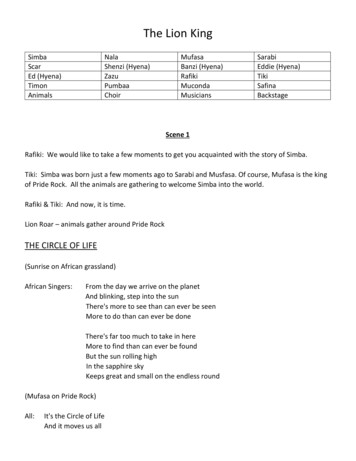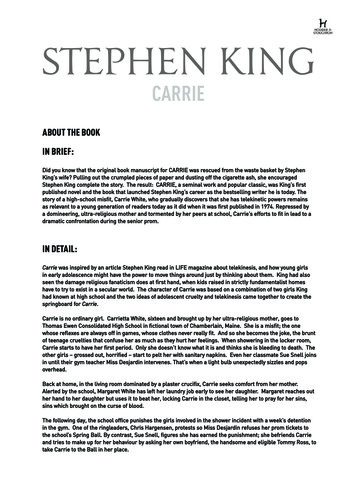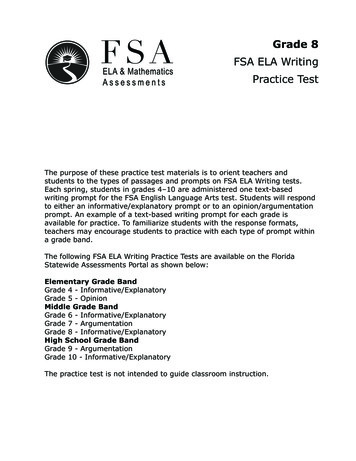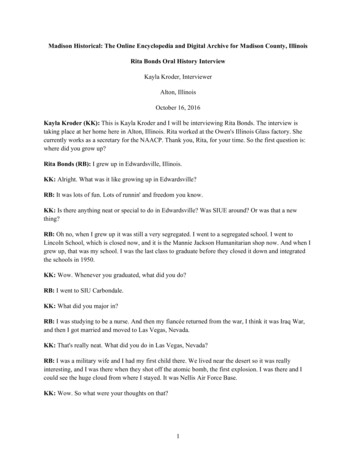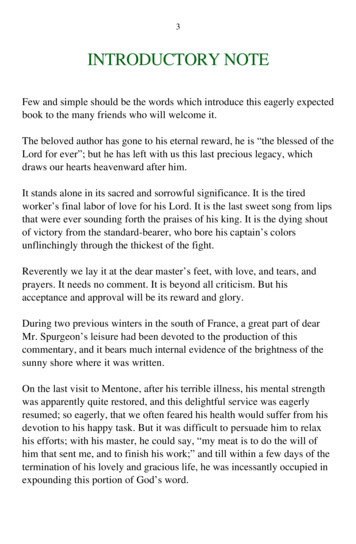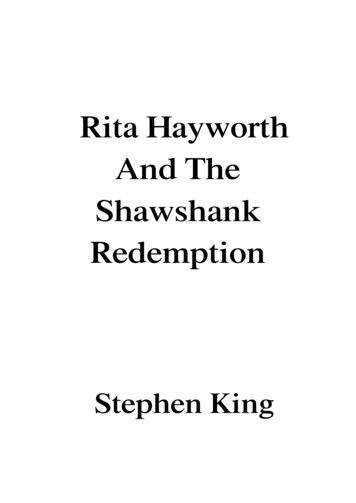
Transcription
Rita HayworthAnd TheShawshankRedemptionStephen King
There's a guy like me in every state and federal prison in America, I guess - I'm theguy who can get it for you. Tailor-made cigarettes, a bag of reefer, if you're partial to that,a bottle of brandy to celebrate your son or daughter's high school graduation, or almostanything else . within reason, that is. It wasn't always that way.I came to Shawshank when I was just twenty, and I am one of the few people in ourhappy little family who is willing to own up to what he did. I committed murder. I put alarge insurance policy on my wife, who was three years older than I was, and then I fixedthe brakes of the Chevrolet coupe her father had given us as a wedding present. It workedout exactly as I had planned, except I hadn't planned on her stopping to pick up theneighbour woman and the neighbour woman's infant son on the way down Castle Hilland into town. The brakes let go and the car crashed through the bushes at the edge of thetown common, gathering speed. Bystanders said it must have been doing fifty or betterwhen it hit the base of the Civil War statue and burst into flames.I also hadn't planned on getting caught, but caught I was. I got a season's pass intothis place. Maine has no death penalty, but the district attorney saw to it that I was triedfor all three deaths and given three life sentences, to run one after the other. That fixed upany chance of parole I might have, for a long, long time. The judge called what I had done'a hideous, heinous crime', and it was, but it is also in the past now. You can look it up inthe yellowing files of the Castle Rock Call, where the big headlines announcing myconviction look sort of funny and antique next to the news of Hitler and Mussolini andFDR's alphabet soup agencies.Have I rehabilitated myself, you ask? I don't know what that word means, at least asfar as prisons and corrections go. I think it's a politician's word. It may have some othermeaning, and it may be that I will have a chance to find out, but that is the future .something cons teach themselves not to think about. I was young, good-looking, and fromthe poor side of town. I knocked up a pretty, sulky, headstrong girl who lived in one ofthe fine old houses on Carbine Street. Her father was agreeable to the marriage if I wouldtake a job in the optical company he owned and 'work my way up'. I found out that whathe really had in mind was keeping me in his house and under his thumb, like adisagreeable pet that has not quite been housebroken and which may bite. Enough hateeventually piled up to cause me to do what I did. Given a second chance I would not do itagain, but I'm not sure that means I am rehabilitated.Anyway, it's not me I want to tell you about; I want to tell you about a guy namedAndy Dufresne. But before I can tell you about Andy, I have to explain a few other thingsabout myself. It won't take long.As I said, I've been the guy who can get it for you here at Shawshank for damn nearforty years. And that doesn't just mean contraband items like extra cigarettes or booze,although those items always top the list. But I've gotten thousands of other items for mendoing time here, some of them perfectly legal yet hard to come by in a place where you'vesupposedly been brought to be punished. There was one fellow who was in for raping alittle girl and exposing himself to dozens of others; I got him three pieces of pink Vermontmarble and he did three lovely sculptures out of them - a baby, a boy of about twelve, and
a bearded young man. He called them The Three Ages of Jesus, and those pieces ofsculpture are now in the parlour of a man who used to be governor of this state.Or here's a name you may remember if you grew up north of Massachusetts - RobertAlan Cote. In 1951 he tried to rob the First Mercantile Bank of Mechanic Falls, and thehold-up turned into a bloodbath - six dead in the end, two of them members of the gang,three of them hostages, one of them a young state cop who put his head up at the wrongtime and got a bullet in the eye. Cote had a penny collection. Naturally they weren't goingto let him have it in here, but with a little help from his mother and a middleman whoused to drive a laundry truck, I was able to get it to him. I told him, Bobby, you must becrazy, wanting to have a coin collection in a stone hotel full of thieves. He looked at meand smiled and said, I know where to keep them. They'll be safe enough. Don't youworry. And he was right. Bobby Cote died of a brain tumour in 1967, but that coincollection has never turned up.I've gotten men chocolates on Valentine's Day; I got three of those green milkshakesthey serve at McDonald's around St Paddy's Day for a crazy Irishman named O'Malley; Ieven arranged for a midnight showing of Deep Throat and The Devil in Miss Jones for aparty of twenty men who had pooled their resources to rent the films . although I endedup doing a week in solitary for that little escapade. It's the risk you run when you're theguy who can get it.I've got ten reference books and fuck-books, joke novelties like handbuzzers anditching powder, and on more than one occasion I've seen that a long-timer has gotten apair of panties from his wife or his girlfriend . and I guess you'll know what guys in heredo with such items during the long nights when time draws out like a blade. I don't get allthose things gratis, and for some items the price comes high. But I don't do it just for themoney; what good is money to me? I'm never going to own a Cadillac car or fly off toJamaica for two weeks in February. I do it for the same reason that a good butcher willonly sell you fresh meat: I got a reputation and I want to keep it. The only two things Irefuse to handle are guns and heavy drugs. I won't help anyone kill himself or anyoneelse. I have enough killing on my mind to last me a lifetime.Yeah, I'm a regular Neiman-Marcus. And so when Andy Dufresne came to me in 1949and asked if I could smuggle Rita Hayworth into the prison for him, I said it would be noproblem at all. And it wasn't.When Andy came to Shawshank in 1948, he was thirty years old. He was a short neatlittle man with sandy hair and small, clever hands. He wore gold-rimmed spectacles. Hisfingernails were always clipped, and they were always clean. That's a funny thing toremember about a man, I suppose, but it seems to sum Andy up for me. He always lookedas if he should have been wearing a tie. On the outside he had been a vice-president in thetrust department of a large Portland bank. Good work for a man as young as he was,especially when you consider how conservative most banks are . and you have tomultiply that conservatism by ten when you get up into New England, where folks don'tlike to trust a man with their money unless he's bald, limping, and constantly plucking at
his pants to get his truss around straight Andy was in for murdering his wife and herlover.As I believe I have said, everyone in prison is an innocent man. Oh, they read thatscripture the way those holy rollers on TV read the Book of Revelations. They were thevictims of judges with hearts of stone and balls to match, or incompetent lawyers, orpolice frame-ups, or bad luck. They read the scripture, but you can see a differentscripture in their faces. Most cons are a low sort, no good to themselves or anyone else,and their worst luck was that their mothers carried them to term.In all my years at Shawshank, there have been less than ten men whom I believedwhen they told me they were innocent. Andy Dufresne was one of them, although I onlybecame convinced of his innocence over a period of years. If I had been on the jury thatheard his case in Portland Superior Court over six stormy weeks in 1947-48, I would havevoted to convict, too.It was one hell of a case, all right; one of those juicy ones with all the right elements.There was a beautiful girl with society connections (dead), a local sports figure (alsodead), and a prominent young businessman in the dock. There was this, plus all thescandal the newspapers could hint at. The prosecution had an open-and-shut case. Thetrial only lasted as long as it did because the DA was planning to run for the US House ofRepresentatives and he wanted John Q Public to get a good long look at his phiz. It was acrackerjack legal circus, with spectators getting in line at four in the morning, despite thesubzero temperatures, to assure themselves of a seat.The facts of the prosecution's case that Andy never contested were these: That he hada wife, Linda Collins Dufresne; that in June of 1947 she had expressed an interest inlearning the game of golf at the Falmouth Hills Country Club; that she did indeed takelessons for four months; that her instructor was the Falmouth Hills golf pro, GlennQuentin; that in late August of 1947 Andy learned that Quentin and his wife had becomelovers; that Andy and Linda Dufresne argued bitterly on the afternoon of 10 September1947; that the subject of their argument was her infidelity.He testified that Linda professed to be glad he knew; the sneaking around, she said,was distressing. She told Andy that she planned to obtain a Reno divorce. Andy told herhe would see her in hell before he would see her in Reno. She went off to spend the nightwith Quentin in Quentin's rented bungalow not far from the golf course. The nextmorning his cleaning woman found both of them dead in bed. Each had been shot fourtimes.It was that last fact that mitigated more against Andy than any of the others. The DAwith the political aspirations made a great deal of it in his opening statement and hisclosing summation. Andrew Dufresne, he said, was not a wronged husband seeking ahot-blooded revenge against his cheating wife; that, the DA said, could be understood, ifnot condoned. But this revenge had been of a much colder type. Consider! the DAthundered at the jury. Four and four! Not six shots, but eight! He had fired the gun empty. and then stopped to reload so he could shoot each of them again! FOUR FOR HIM
AND FOUR FOR HER, the Portland Sun blared. The Boston Register dubbed him TheEven-Steven Killer.A clerk from the Wise Pawnshop in Lewiston testified that he had sold a six-shot .38Police Special to Andrew Dufresne just two days before the double murder. A bartenderfrom the country club bar testified that Andy had come in around seven o'clock on theevening of 10 September, had tossed off three straight whiskeys in a twenty-minuteperiod - when he got up from the bar-stool he told the bartender that he was going up toGlenn Quentin's house and he, the bartender, could 'read about the rest of it in thepapers'. Another clerk, this one from the Handy-Pik store a mile or so from Quentin'shouse, told the court that Dufresne had come in around quarter to nine on the same night.He purchased cigarettes, three quarts of beer, and some dish-towels. The county medicalexaminer testified that Quentin and the Dufresne woman had been killed between elevenp.m. and two a.m. on the night of 10-11 September. The detective from the AttorneyGeneral's office who had been in charge of the case testified that there was a turnout lessthan seventy yards from the bungalow, and that on the afternoon of 11 September, threepieces of evidence had been removed from that turnout: first item, two empty quartbottles of Narragansett Beer (with the defendant's fingerprints on them); the second item,twelve cigarette ends (all Kools, the defendant's brand); third item, a plaster moulage of aset of tyre tracks (exactly matching the tread-and-wear pattern of the tyres on thedefendant's 1947 Plymouth).In the living room of Quentin's bungalow, four dishtowels had been found lying onthe sofa. There were bullet-holes through them and powder-burns on them. The detectivetheorized (over the agonized objections of Andy's lawyer) that the murderer had wrappedthe towels around the muzzle of the murder-weapon to muffle the sound of the gunshots.Andy Dufresne took the stand in his own defence and told his story calmly, coolly,and dispassionately. He said he had begun to hear distressing rumours about his wife andGlenn Quentin as early as the last week in July. In August he had become distressedenough to investigate a bit. On an evening when Linda was supposed to have goneshopping in Portland after her tennis lesson, Andy had followed her and Quentin toQuentin's one-storey rented house (inevitably dubbed 'the love-nest' by the papers). Hehad parked in the turnout until Quentin drove her back to the country club where her carwas parked, about three hours later.'Do you mean to tell this court that your wife did not recognize your brand-newPlymouth sedan behind Quentin's car?' the DA asked him on cross-examination.'I swapped cars for the evening with a friend,' Andy said, and this cool admission ofhow well-planned his investigation had been did him no good at all in the eyes of the jury.After returning the friend's car and picking up his own, he had gone home. Linda hadbeen in bed, reading a book. He asked her how her trip to Portland had been. She repliedthat it had been fun, but she hadn't seen anything she liked well enough to buy. That'swhen I knew for sure,' Andy told the breathless spectators. He spoke in the same calm,remote voice in which he delivered almost all of his testimony.
'What was your frame of mind in the seventeen days between then and the night yourwife was murdered?' Andy's lawyer asked him.'I was in great distress,' Andy said calmly, coldly. Like a man reciting a shopping listhe said that he had considered suicide, and had even gone so far as to purchase a gun inLewiston on 8 September.His lawyer then invited him to tell the jury what had happened after his wife left tomeet Glenn Quentin on the night of the murders. Andy told them . and the impressionhe made was the worst possible.I knew him for close to thirty years, and I can tell you he was the most self-possessedman I've ever known. What was right with him he'd only give you a little at a time. Whatwas wrong with him he kept bottled up inside. If he ever had a dark night of the soul, assome writer or other has called it, you would never know. He was the type of man who, ifhe had decided to commit suicide, would do it without leaving a note but not until hisaffairs had been put neatly in order. If he had cried on the witness stand, or if his voicehad thickened and grown hesitant, even if he had gotten yelling at that Washingtonbound District Attorney, I don't believe he would have gotten the life sentence he woundup with. Even if he had've he would have been out on parole by 1954. But he told his storylike a recording machine, seeming to say to the jury: this is it. Take it or leave it. They leftit.He said he was drunk that night, that he'd been more or less drunk since 24 August,and that he was a man who didn't handle his liquor very well. Of course that by itselfwould have been hard for any jury to swallow. They just couldn't see this coldly selfpossessed young man in the neat double-breasted three-piece woollen suit ever gettingfalling-down drunk over his wife's sleazy little affair with some small-town golf pro. Ibelieved it because I had a chance to watch Andy that those six men and six women didn'thave.Andy Dufresne took just four drinks a year all the time I knew him. He would meetme in the exercise yard every year about a week before his birthday and then again abouttwo weeks before Christmas. On each occasion he would arrange for a bottle of JackDaniels. He bought it the way most cons arrange to buy their stuff-the slave's wages theypay in here, plus a little of his own. Up until 1965 what you got for your time was a dimean hour. In '65 they raised it all the way up to a quarter. My commission on liquor wasand is ten per cent, and when you add on that surcharge to the price of a fine sippin'whiskey like the Black Jack, you get an idea of how many hours of Andy Dufresne's sweatin the prison laundry was going to buy his four drinks a year.On the morning of his birthday, 20 September, he would have himself a big knock,and then he'd have another that night after lights out. The following day he'd give the restof the bottle back to me, and I would share it around. As for the other bottle, he dealthimself one drink Christmas night and another on New Year's Eve. Then that one wouldalso come to me with instructions to pass it on. Four drinks a year -and that is thebehaviour of a man who has been bitten hard by the bottle. Hard enough to draw blood.
He told the jury that on the night of the 10th he had been so drunk he could onlyremember what had happened in little isolated snatches. He had gotten drunk thatafternoon - 'I took on a double helping of Dutch courage' is how he put it -before takingon Linda.After she left to meet Quentin, he remembered deciding to confront them. On the wayto Quentin's bungalow, he swung into the country club for a couple of quick ones. Hecould not, he said, remember telling the bartender he could 'read about the rest of it in thepapers', or saying anything to him at all. He remembered buying beer in the Handy-Pik,but not the dishtowels. 'Why would I want dishtowels?' he asked, and one of the papersreported that three of the lady jurors shuddered.Later, much later, he speculated to me about the clerk who had testified on the subjectof those dishtoweis, and I think it'i worth jotting down what he said. 'Suppose that,during their chmvmhn fur witnesses,' Andy said one day in the oxwulio yard, 'theystumble on this fellow who sold me the beer that night. By then three days have gone by.The facts of the case have been broadsided in all the papers. Maybe they ganged up on theguy, five or six cops, plus the dick from the attorney general's office, plus the DA'sassistant. Memory is a pretty subjective thing, Red. They could have started out with "Isn'tit possible that he purchased four or five dishtowels?" and worked their way up fromthere. If enough people want you to remember something, that can be a pretty powerfulpersuader.'I agreed that it could.'But there's one even more powerful,' Andy went on in that musing way of his. 'Ithink it's at least possible that he convinced himself. It was the limelight. Reporters askinghim questions, his picture in the papers . all topped, of course, by his star turn in court.I'm not saying that he deliberately falsified his story, or perjured himself. I think it'spossible that lie could have passed a lie detector test with flying colours, or sworn on hismother's sacred name that I bought those dishtowels. But still . memory is such agoddam subjective thing.'I know this much: even though my own lawyer thought I had to be lying about halfmy story, he never bought that business about the dishtowels. It's crazy on the face of it. Iwas pig-drunk, too drunk to have been thinking about muffling the gunshots. If I'd doneit, I just would have let them rip.'He went up to the turnout and parked there. He drank beer and smoked cigarettes.He watched the lights downstairs in Quentin's place go out. He watched a single light goon upstairs . and fifteen minutes later he watched that one go out. He said he could guessthe rest.'Mr Dufresne, did you then go up to Glenn Quentin's house and kill the two of them?'his lawyer thundered.'No, I did not,' Andy answered. By midnight, he said, he was sobering up. He wasalso feeling the first signs of a bad hangover. He decided to go home and sleep it off andthink about the whole thing in a more adult fashion the next day. 'At that time, as I drove
home, I was beginning to think that the wisest course would be to simply let her go toReno and get her divorce.''Thank you, Mr Dufresne.'The DA popped up.'You divorced her in the quickest way you could think of, didn't you? You divorcedher with a .38 revolver wrapped in dishtowels, didn't you?''No sir, I did not,' Andy said calmly.'And then you shot her lover.''No, sir.''You mean you shot Quentin first?''I mean I didn't shoot either one of them. I drank two quarts of beer and smokedhowever many cigarettes that the police found at the turnout. Then I drove home andwent to bed.''You told the jury that between 24 August and 10 September, you were feelingsuicidal.''Yes, sir.''Suicidal enough to buy a revolver.''Yes.''Would it bother you overmuch, Mr Dufresne, if I told you that you do not seem to meto be the suicidal type?''No,' Andy said, 'but you don't impress me as being terribly sensitive, and I doubtvery much that, if I were feeling suicidal, I would take my problem to you.'There was a slight tense titter in the courtroom at this, but it won him no points withthe jury.'Did you take your .38 with you on the night of September?''No; as I've already testified -''Oh, yes!' The DA smiled sarcastically. 'You threw it into the river, didn't you? TheRoyal River. On the afternoon of 9 September.''Yes, sir.''One day before the murders.''Yes, sir.'That's convenient, isn't it?''It's neither convenient nor inconvenient. Only the truth.''I believe you heard Lieutenant Mincher's testimony?' Mincher had been in charge ofthe party which had dragged the stretch of the Royal near Pond Bridge, from which Andyhad testified he had thrown the gun. The police had not found it.'Yes, sir. You know I heard it.'
Then you heard him testify that they found no gun, although they dragged for threedays. That was rather convenient, too, wasn't it?''Convenience aside, it's a fact that they didn't find the gun,' Andy responded calmly.'But I should like to point out to both you and the jury that the Pond Road Bridge is veryclose to where the Royal River empties into the Bay of Yarmouth. The current is strong.The gun may have been carried out into the bay itself.''And so no comparison can be made between the riflings on the bullets taken from thebloodstained corpses of your wife and Mr Glenn Quentin and the riflings on the barrel ofyour gun. That's correct, isn't it, Mr Dufresne?''Yes.''That's also rather convenient, isn't it?'At that, according to the papers, Andy displayed one of the few slight emotionalreactions he allowed himself during the entire six-week period of the trial. A slight, bittersmile crossed his face.'Since I am innocent of this crime, sir, and since I am telling the truth about throwingmy gun into the river the day before the crime took place, then it seems to me decidedlyinconvenient that the gun was never found.'The DA hammered at him for two days. He re-read the Handy-Pik clerk's testimonyabout the dishtowels to Andy. Andy repeated that he could not recall buying them, butadmitted that he also couldn't remember not buying them.Was it true that Andy and Linda Dufresne had taken out a joint insurance policy inearly 1947? Yes, that was true. And if acquitted, wasn't it true that Andy stood to gain 50,000 in benefits? True. And wasn't it true that he had gone up to Glenn Quentin's housewith murder in his heart, and wasn't it also true that he had indeed committed murdertwice over? No, it was not true. Then what did he think had happened, since there hadbeen no signs of robbery?'I have no way of knowing that, sir,' Andy said quietly.The case went to the jury at one p.m. on a snowy Wednesday afternoon. The twelvejurymen and women came back at three-thirty. The bailiff said they would have been backearlier, but they had held off in order to enjoy a nice chicken dinner from Bentley'sRestaurant at the county's expense. They found him guilty, and brother, if Maine had thedeath penalty, he would have done the airdance before that spring's crocuses poked theirheads out of the dirt.The DA had asked him what he thought had happened, and Andy slipped thequestion - but he did have an idea, and I got it out of him late one evening in 1955. It hadtaken those seven years for us to progress from nodding acquaintances to fairly closefriends - but I never felt really close to Andy until 1960 or so, and I believe I was the onlyone who ever did get really close to him. Both being long-timers, we were in the samecellblock from beginning to end, although I was halfway down the corridor from him.
'What do I think?' He laughed - but there was no humour in the sound. 'I think therewas a lot of bad luck floating around that night. More than could ever get together in thesame short span of time again. I think it must have been some stranger, just passingthrough. Maybe someone who had a flat tyre on that road after I went home. Maybe aburglar. Maybe a psychopath. He killed them, that's all. And I'm here.'As simple as that. And he was condemned to spend the rest of his life in Shawshank or the part of it that mattered. Five years later he began to have parole hearings, and hewas turned down just as regular as clockwork in spite of being a model prisoner. Gettinga pass out of Shawshank when you've got murder stamped on your admittance-slip isslow work, as slow as a river eroding a rock. Seven men sit on the board, two more than atmost state prisons, and every one of those seven has an ass as hard as the water drawn upfrom a mineral-spring well. You can't buy those guys, you can't no, you can't cry for them.As far as the board concerned, money don't talk, and nobody walks. Pc other reasons inAndy's case as well . but that belongs a little further along in my story.There was a trusty, name of Kendricks, who was into me for some pretty heavymoney back in the fifties, and it was four years before he got it all paid off. Most of theinterest he paid me was information - in my line of work, you're dead if you can't findways of keeping your ear to the ground. This Kendricks, for instance, had access torecords I was never going to see running a stamper down in the goddam plate-shop.Kendricks told me that the parole board vote was 7-0 against Andy Dufresne through1957,6-1 in '58, 7-0 again in '59, and 5-2 in '60. After that I don't know, but I do know thatsixteen years later he was still in Cell 14 of Cellblock 5. By then, 1976, he was fifty-eight.They probably would have fatten big-hearted and let him out around 1983. They give youlife, and that's what they take - all of it that counts, anyway. Maybe they set you loosesomeday, but . well. Listen: I knew this guy, Sherwood Bolton, his name was, and he hadthis pigeon in his cell. From 1945 until 1953, when they let him out, he had that pigeon. Hewasn't any Birdman of Alcatraz; he just had this pigeon. Jake, he called him. He set Jakefree a day before he, Sherwood, that is, was to walk, and Jake flew away just as pretty asyou could want. But about a week after Sherwood Bolton left our happy little family, afriend of mine called me over to the west corner of the exercise yard, where Sherwoodused to hang out, and my friend said: 'Isn't that Jake, Red?' It was. That pigeon was just asdead as a turd.I remember the first time Andy Dufresne got in touch with me for something; Iremember like it was yesterday. That wasn't the time he wanted Rita Hayworth, though.That came later. In that summer of 1948 he came around for something else.Most of my deals are done right there in the exercise yard, and that's where this onewent down. Our yard is big, much bigger than most. It's a perfect square, ninety yards ona side. The north side is the outer wall, with a guardtower at either end. The guards upthere are armed with binoculars and riot guns. The main gate is in that north side. Thetruck loading-bays are on the south side of the yard. There are five of them. Shawshank is
a busy place during the work-week - deliveries in, deliveries out. We have the licenseplate factory, and a big industrial laundry that does all the prison wetwash, plus that ofKittery Receiving Hospital and the Eliot Sanatorium. There's also a big automotive garagewhere mechanic inmates fix prison, state, and municipal vehicles - not to mention theprivate cars of the screws, the administration officers . and, on more than one occasion,those of the parole board.The east side is a thick stone wall full of tiny slit windows. Cellblock 5 is on the otherside of that wail. The west side is Administration and the infirmary. Shawshank has neverbeen as overcrowded as most prisons, and back in '48 it was only filled to something liketwo-thirds capacity, but at any given time there might be eighty to a hundred and twentycons on the yard - playing toss with a football or a baseball, shooting craps, jawing at eachother, making deals. On Sunday the place was even more crowded; on Sunday the placewould have looked like a country holiday . if there had been any women.It was on a Sunday that Andy first came to me. I had just finished talking to ElmoreArmitage, a fellow who often came in handy to me, about a radio when Andy walked up.I knew who he was, of course; he had a reputation for being a snob and a cold fish. Peoplewere saying he was marked for trouble already. One of the people saying so was BogsDismond, a bad man to have on your case. Andy had no cellmate, and I'd heard that wasjust the way he wanted it, although the one-man cells in Cellblock 5 were only a littlebigger than coffins. But I don't have to listen to rumours about a man when I can judgehim for myself.'Hello,' he said. 'I'm Andy Dufresne.' He offered his hand and I shook it. He wasn't aman to waste time being social; he got right to the point. 'I understand that you're a manwho knows how to get things.'I agreed that I was able to locate certain items from time to time,'How do you do that?' Andy asked.'Sometimes,' I said, 'things just seem to come into my hand. I can't explain it. Unlessit's because I'm Irish.'He smiled a little at that. 'I wonder if you could get me a rock hammer.''What would that be, and why would you want it?'Andy looked surprised. 'Do you make motivations a part of your business?' Withwords like those I could understand how he had gotten a reputation for being the snobbysort, the kind of guy who likes to put on airs - but I sensed a tiny thread of h
When Andy came to Shawshank in 1948, he was thirty years old. He was a short neat little man with sandy hair and small, clever hands. He wore gold-rimmed spectacles. His fingernails were always clipped, and they were always clean. That's a funny thing to remember about a man, I supp
